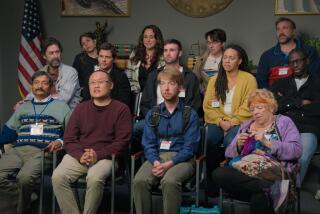A Foreman Finishes His Grand Tour of Jury Duty
- Share via
Edward E. Roseman harbored no illusions about serving as foreman of the 1986-87 Los Angeles County Grand Jury.
Having done his research, the 72-year-old Sherman Oaks man knew it has been a long time since editors depended on the actions of the grand jury to sell newspapers.
Ever since a 1978 California Supreme Court ruling that gave people the right to a preliminary hearing even after indictment, the amount of grand jury time spent on criminal cases has been drastically reduced.
It was precisely the power to indict that in the past guaranteed screaming headlines for successive grand juries.
Investigative Process
But these days, 80% of the grand jury’s work involves investigating city and county government and special districts of local government, according to a 1985 pamphlet distributed by the county.
As outlined in the final report of the 1986-87 grand jury, this includes reporting on the management policies and fiscal operations of county offices and departments, cities, joint-power agencies and special purpose assessment and taxing districts within the county.
Not exactly sensational stuff, but Roseman couldn’t have cared less.
“There was always something to do,” said Roseman, whose one-year stint on the grand jury concluded last summer. “There are more important things than sexy murder cases.”
Roseman helped persuade his 22 fellow jurors to investigate a number of areas, including Skid Row housing, availability of health-care services in the county and the management of the Weingart Center, a downtown facility that provides health-care services and alcoholism rehabilitation. Under Roseman’s guidance, they also reinstituted a policy of issuing interim reports, a way to ensure that the Board of Supervisors acted swiftly on grand jury recommendations.
“We were able to see results without having to wait 90 days,” Roseman said.
Programs Implemented
Perhaps Roseman’s proudest moment occurred when he and other jurors returned to the Weingart Center and saw that their proposals for organizing its programs and budget had been implemented.
The grand jury’s final report, which runs 187 pages, is filled with ideas for improving county government, agencies, institutions.
“I think all our egos were enlarged by leaving a little mark on the community,” Roseman said.
The 1986-87 grand jury even took the time to write a report that offered advice to its successor. As a result, Roseman said, “this grand jury should be a better grand jury than we were.”
Roseman not only played a key role in setting the grand jury’s agenda, but he also kept peace among jurors. It was not uncommon for 23 opinionated people to disagree on subjects to pursue, or on setting goals.
Diplomatic Skills
By all indications Roseman, who was vice-president of Abbey Rents before he retired, displayed the negotiating skills of a veteran diplomat.
“He was a very gentle man, and a gentleman,” said juror Concepcion Minsky. “He tried his best to keep the jury together.”
Only once did events reach the point of high drama.
Roseman confronted a juror responsible for leaking information about a rape case investigation to the press. In a tense meeting, Roseman criticized the man for making public what the foreman believes should always remain private.
“I felt the entire jury was embarrassed by his actions,” Roseman said. The chastised juror eventually resigned.
These were among the things that the hours of orientation provided by supervisors and assistant district attorneys did not specifically address. Still, Roseman said, “I looked forward to going downtown every day.”
Must Be Serious
Just to make a commitment to serve on the grand jury indicates a seriousness of purpose.
Roseman, happily retired for five years, had to readjust to a life of 7:30 a.m. freeway traffic jams, bureaucratic hassles and hard work. The financial compensation is minimal--$25 per day plus free mileage and free parking at the downtown Criminal Courts Building, where the grand jury meets.
He admitted there were some inconveniences. “I was not particularly keen on getting up so early,” he said.
Roseman became a grand juror for the same reason people 50 years younger--and with less time on their hands and fewer dollars in the bank--embrace social and political causes.
“I believe we owe more than lip service to the community,” he said.
About 18 months ago he sought Van Nuys Superior Court Judge Irwin J. Nebron to discuss serving on the grand jury. Nebron subsequently nominated Roseman.
Ongoing Process
The process did not end there. From a list of 200 or more people nominated by Superior Court judges around the county, the county clerk selects 40 names by lottery.
After this group has been screened by law enforcement agencies, a second drawing takes place and the final 23 jurors and four alternates are chosen. It’s all a matter of luck.
Becoming foreman is different. Roseman had no initial desire to serve in the position, but he began to get noticed when he prowled the Criminal Courts Building to learn about the grand jury.
“I didn’t know about all the grand jury functions,” he said.
County officials, accustomed to seeing Roseman in the halls, asked him if he would mind being foreman. He expressed an interest, was interviewed and eventually was selected.
Officiating, Investigating
Roseman’s day consisted of officiating at grand jury proceedings and going into the field to investigate firsthand a variety of county facilities, including jails and hospitals.
Sometimes, he even made news.
Last spring, Roseman wrote a lengthy letter to the Board of Supervisors detailing a major grand jury investigation of the problem-plagued RTD: “The SCRTD problems are real and must be addressed immediately and without equivocation in order to retain any semblance of public support.” The actual report received extensive coverage in the local press.
Serving on the grand jury, which necessarily involves many meetings and conferences, Roseman and his fellow jurors became friends. People who weeks earlier had never met became dinner companions. Birthdays, including Roseman’s, were celebrated with streamers, banners and a piece of cake for everyone.
And though the jury disbanded several weeks ago, Roseman and his wife still go out with other members and their spouses.
There are, however, some changes. An ex-foreman does not simply walk into the office of an important county official and have a chat.
“After having finished with the grand jury, I don’t get the same reception,” he said.
More to Read
Sign up for Essential California
The most important California stories and recommendations in your inbox every morning.
You may occasionally receive promotional content from the Los Angeles Times.










